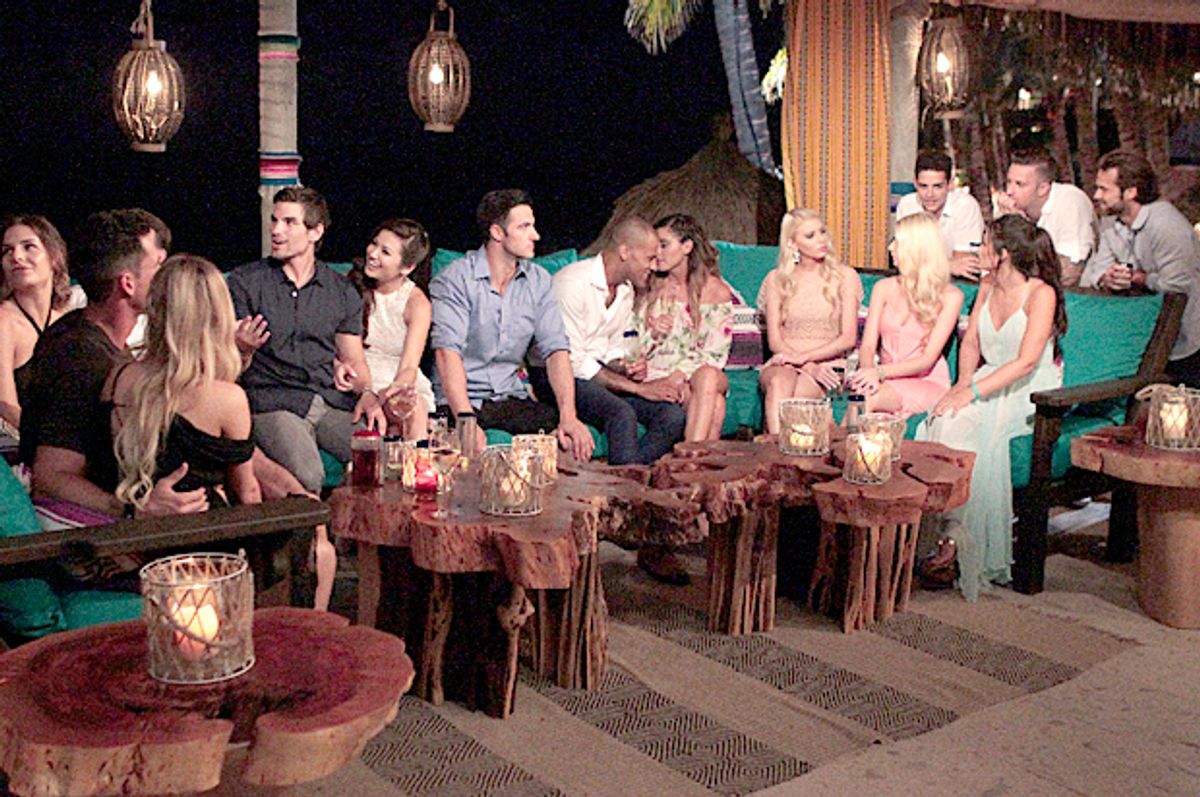On Sunday, Warner Brothers announced it was halting production on "Bachelor in Paradise" — a spinoff of ABC's "The Bachelor" franchise — after DeMario Jackson was accused of sexually assaulting fellow contestant Corinne Olympios.
"We have become aware of allegations of misconduct on the set of 'Bachelor in Paradise' in Mexico," the production company said in a statement. "We have suspended production and we are conducting a thorough investigation of these allegations. Once the investigation is complete, we will take appropriate responsive action."
The show's fourth season, set in Sayulita, Mexico, was set to premiere on August 8.
In a series of text messages obtained by The New York Post, Jackson maintained his innocence and told an unknown acquaintance that he believed footage of the alleged assault will corroborate his account.
Both Olympios and Jackson released separate statements through their respective representatives on Wednesday. In hers, Olympios confirmed that she's "retained a group of professionals . . . including hiring a lawyer."
"I am a victim and have spent the last week trying to make sense of what happened on June 4. Although I have little memory of that night, something bad obviously took place," she said. "As a woman, this is my worst nightmare and it has now become my reality."
In his statement, Jackson said, "It's unfortunate that my character and family name has been assassinated this past week with false claims and malicious allegations." He added, "I will be taking swift and appropriate legal action until my name is cleared and, per the advice of legal counsel, will be seeking all available remedies entitled to me under the laws."
Absent the footage, there's no concrete evidence proving or disproving either claim. Should the sexual assault allegations be proven even half-true, though, the question will be: To what extent did producers facilitate the encounter? And, thus, to what extent should they be held accountable?
TMZ got ahold of the "Bachelor in Paradise" contracts, in which contestants sign away their right to sue the show in the event of "personal injury (including without limitation, any injuries arising out of the transmission of a sexually transmitted disease or unwelcome/unlawful contact or other interaction among participants)."
So in a strictly legal sense, the show's producers are not accountable for what allegedly took place.
But, "There's a catch," TMZ added, "courts have made it clear in situations involving similar contracts, if the producers were reckless that clause would not be enforceable. And it would seem watching someone incapable of giving consent to sexual activity and allowing it to happen . . . is reckless."
According to an anonymous, unconfirmed crew member's account given to the The Daily Mail, "Corrine and DeMario found out when they arrived in Mexico that the story line would involve the two of them hooking up so they decided to hang out and get better acquainted over drinks . . . Soon they decided to go swimming and when they climbed into the Jacuzzi, they were both loaded. Corrine proceeded to remove her bathing suit and things got increasingly sexual."
The crew member added:
"There was hugging and kissing and touching, but before long, she seemed to go limp and was sliding under water. DeMario kept trying to hold her up and at the same time he appeared to be having intercourse with her. After he finished — which only lasted a few seconds — he lifted her out of the water and laid her on the cement, where he proceeded to have oral sex with her. She appeared to be unconscious. At that point some of the crew came out and carried her off to her room. She was limp and seemed unable to walk on her own."
"Bachelor in Paradise," like any reality television show, is as formulaic as a sitcom. And part of manipulating the story arc — heightening tension, injecting comedy — requires producers manipulating cast members' behaviors via an open bar. (Consider that in previous seasons of "Bachelor in Paradise," bartender Jorge Moreno became a relative star in his own right.)
If these allegations are true, the show's producers would have been accessory to the misconduct every step of the way in a moral sense and, perhaps, in a civil one as well (it's easy to imagine given the tone of Olympios' statement that some sort of lawsuit is indeed forthcoming.)
And, yet, due to the nature of the contracts both the accused and the accuser signed and the fact that the assault — if indeed one was committed — occurred in Mexico and all possible defendants are now on this side of the border, investigating or prosecuting criminal charges may simply be too complicated for local or U.S. authorities to handle. It's unclear how, when or even if any agency in either country will.
What is clear is that this incident — and others before it — demand a critical and legal reassessment of how reality-show producers employ and care for their performers.
Certainly, workplace assault and harassment is still a massive problem, yet legal avenues exist to address it and — in theory — no internal corporate agreement would shield the accessed from lawsuits or prosecution. Similarly, criminal and civil responses to a performer in scripted sex scene filmed for a dramatic show or movie who somehow, in some way crossed over a line and robbed a fellow actor of consent would not be hemmed in by liability waivers or non-disclosure agreements. Even the porn industry has taken steps to define where the line between acceptable relations and assault lies, even if sometimes it fails in that regard.
Why then let reality producers, of all employers, hide behind a wall of contracts? Are they in some way special? Are they in some way different? If their reckless, reality-based business model ruins real lives, shouldn't there be real consequences?



Shares